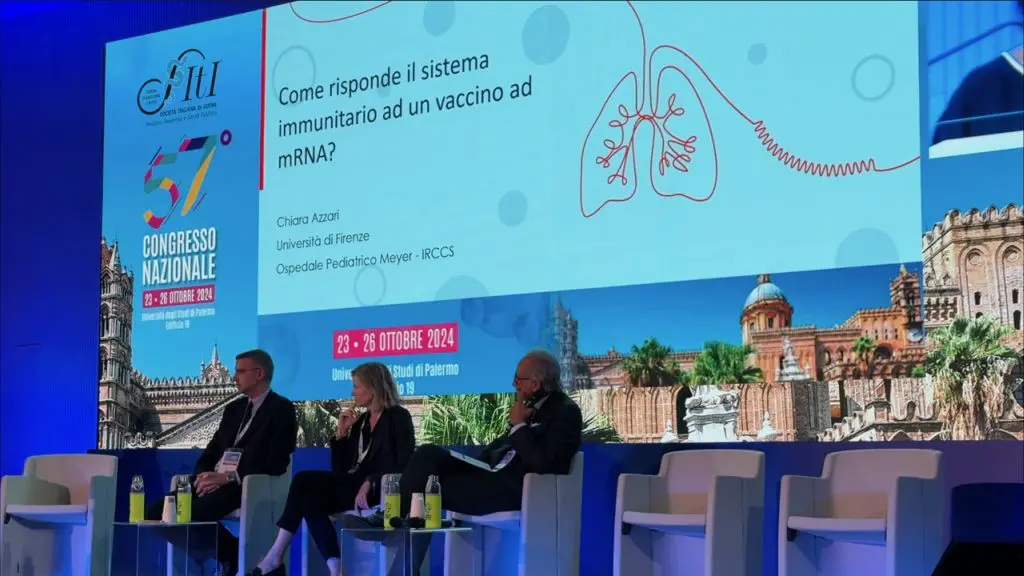PALERMO (ITALPRESS) – Moderna Italy, the Italian subsidiary of Moderna, announced today that the Italian Medicines Agency (AIFA) marketing classification determination for mRNA-1345, a respiratory syncytial virus (RSV) mRNA vaccine, for the protection of adults aged 60 years and older from lower respiratory tract disease caused by RSV infection, has been published in the Official Gazette. The AIFA authorization follows the Positive Opinion of the Committee for Medicinal Products for Human Use (CHMP) of the European Medicines Agency (EMA) and the marketing authorization issued by the European Commission (EC) last August 22, which is valid in all 27 EU member states, as well as Iceland, Liechtenstein and Norway. “The approval of mRNA-1345 is an important milestone for Italian public health and underscores Moderna’s leadership in the field of mRNA. This is the first approval of an mRNA vaccine for a disease other than COVID,” said Jacopo Murzi, General Manager of Moderna Italy. “mRNA-1345 protects older adults from severe RSV outcomes and is the only RSV vaccine offered in a pre-filled syringe to facilitate administration, reducing preparation time and administration errors. “RSV is a highly contagious seasonal respiratory virus and a major cause of lower respiratory tract infections and pneumonia. The disease caused by the virus has a particularly high impact in infants and the elderly. In the European Union, RSV is estimated to cause about 160,000 hospitalizations in adults each year, with 92 percent of these hospitalizations occurring in adults aged 65 years and older.The marketing authorization for mRNA-1345 is based on positive data from the Phase 3 ConquerRSV clinical trial, a global study of about 37,000 adults aged 60 years and older in 22 countries. The primary analysis with 3.7 months median follow-up found vaccine effectiveness (VE), against lower respiratory tract disease (LRTD) caused by RSV, of 83.7% (CI 95.88%: 66.0%, 92.2%), results later published in The New England Journal of Medicine. In an additional analysis, with 8.6 months median follow-up, mRNA- 1345 maintained sustained efficacy, with a VE of 63.3% (95% CI: 48.7%, 73.7%) against RSV-LRTD with two or more symptoms. VE was 74.6% (95% CI: 50.7%, 86.9%) against RSV-LRTD with =2 symptoms, including dyspnea, and VE was 63.0% (95% CI: 37.3%, 78.2%) against RSV LRTD with three or more symptoms.”The mRNA platform comprehensively activates the immune system by giving the information to the immune system of endogenously creating the protein to activate the antibody response,” explained Cinzia Marano, Medical Director Moderna Italia at an event in Palermo. “It is one of the most studied innovations in recent years, there is a robust safety profile and important efficacy. “The study’s rigorous statistical criterion, with lower limit of the 95% CI of VE >20%, was met for both endpoints. The most commonly reported adverse reactions were pain at the injection site, fatigue, headache, myalgia, and arthralgia.In May 2024, the Food and Drug Administration (FDA) in the U.S. approved mRNA-1345 for the protection of adults aged 60 years and older from lower respiratory tract disease caused by RSV infection. The approval was granted under a breakthrough therapy designation and was Moderna’s second mRNA product to be approved. Moderna has submitted marketing authorization applications for mRNA-1345 in several markets worldwide. “The mRNA technology has been a real revolution in vaccination,” commented Francesco Vitale, Full Professor of Hygiene and Preventive Medicine at the University of Palermo. “We think that, in the Covid era, it has been able to create an effective and safe vaccine in a very short time. We were able to benefit from it within a year (as opposed to the eight to 10 years needed for the development of a traditional vaccine). Not only that, this technology bases its effectiveness on the fact that it replaces the protein with a code that instructs the immune system to arm itself against the disease, with a very high margin of safety since the vaccine does not enter the genome and is excreted after it has done its job.””We in the scientific community,” he emphasized, “can only applaud the new mRNA vaccine against RSV, a sneaky disease that has such an unspecific connotation that it is often confused with a common cold or flu syndrome, but which, instead, can give rise to severe forms of pneumonia or other forms of serious and sometimes fatal respiratory diseases. This is why it is important that especially frail groups or those over 65 get vaccinated. Let’s keep in mind that RSV causes more than 20,000 hospitalizations a year for severe pneumonia among the over-65s. Now that, we not only know about it, we can fight it. Therefore, it is clear that this virus has become a public health priority.” “RSV, although until now little treated because no preventive measures were available, has always had an important incidence on the population of all ages, but with a decidedly heavy impact on the most fragile categories: children and seniors in primis,” confirmed Roberta Siliquini, president of the Society of Hygiene, Preventive Medicine and Public Health. “It took decades before we got the first vaccines, to which, today, we add the Moderna vaccine, developed in a much shorter time thanks to the revolutionary mRNA technology. Vaccinating against RSV is important, and the COVID-19 experience should have educated us about the desirability of protecting ourselves from microorganisms whose impact on health can be severe. On the subject of RSV, we know that its prevalence is very wide, although it is difficult to have accurate data since this disease often goes undiagnosed. However, in its most severe manifestations we know that it is a major burden on the National Health System. That is why vaccinating is important not only for the protection of personal health, but is an act of social responsibility.”
– Italpress photo –
(ITALPRESS).

